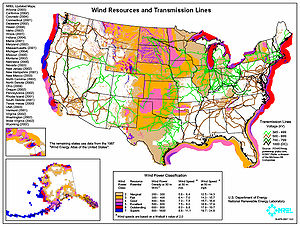forum
library
tutorial
contact

Report: Wake Up, the
Clean Energy 'Revolution' is Here
by Garrett Hering
GreenBiz, February 11, 2014
|
the film forum library tutorial contact |

|
Report: Wake Up, the
by Garrett Hering
|
 Call it a detour, a hiccup or a temporary catching of breath.
Call it a detour, a hiccup or a temporary catching of breath.
Despite last year's dramatic drop-off in newly installed renewable electric generating capacity in the United States, America remains in the thick of a far-reaching sustainable energy "revolution" with "major implications for the U.S. economy, energy security and global concerns over climate change," according to a new report by Bloomberg New Energy Finance.
The Sustainable Energy in America 2014 Factbook shows a seemingly ominous 70-percent collapse in overall renewable capacity additions in 2013 -- all the way down to 5.4 gigawatts from a record 18 gigawatts installed in 2012. The report was commissioned by the Business Council for Sustainable Energy and released last week in Washington, D.C.
The weakest year for annual U.S. renewable electric generating capacity additions since 2007 largely was the result of downturn in wind energy development due to inconsistent and eventually expiring tax credits, which offset a record 4.2 gigawatts of solar generating capacity added last year.
But total renewable generation, including hydropower, still rose to nearly 13 percent of the U.S. electric power mix in 2013, up from 12 percent in 2012 and only 8 percent in 2007, according to this second edition of the report, which forecast a return to growth for the U.S. wind installations in 2014 along with continued growth for solar.
Wind energy's down year in 2013 was one of just a few "noteworthy detours" from the report's central theme -- namely, that "a revolution is transforming how the U.S. produces, delivers and consumes energy" and that these recent advances in energy efficiency, transportation and power generation "have combined to put U.S. CO2 emissions on a long-term downward trajectory."
Key findings
Among the 133-page report's key findings are:
"The effects of these changes will be felt in seemingly every nook and cranny of the American economy, from military bases to manufacturing plants, from homes to highways," said Di Capua. "2013 saw some detours from the long-term trends, but overall, it is clear that the long-term transformation of how the U.S. produces and consumes its energy continues."
Lisa Jacobson, president of the Business Council for Sustainable Energy, a Washington, D.C.-based coalition of companies and trade groups from energy efficiency, natural gas and renewable energy sectors, called on U.S. legislators and policy makers to "clarify and stabilize clean energy policies both at the federal and state levels in order to accelerate America's energy transformation."
learn more on topics covered in the film
see the video
read the script
learn the songs
discussion forum
